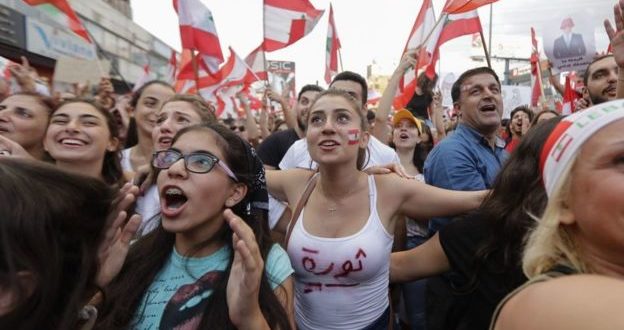Andrew England
Unemployment and lack of reforms underpin protests in Middle East and north Africa
Protesters outside the government palace in Beirut with ‘Revolution’ painted on their faces © AP
When Lebanon imposed a fee on WhatsApp calls to boost government coffers, it was another example of Arab politicians misreading the public mood. Within hours, hundreds of thousands of Lebanese were on the streets, their disillusionment with their leaders exploding to the surface as mass protests erupted in Beirut and other cities.
It was just the latest example of the rage simmering across the Arab world as ruling elites oversee rotten political systems that fail to deliver basic economic needs.
Last month, it was the redeployment of a popular commander of Iraq’s counter-terrorism forces that sparked the worst unrest in Baghdad for years. Before that, it was a little-known contractor’s diatribes against Abdel Fattah al-Sisi, Egyptian president, and allegations of corruption that provoked rare protests in one of the Middle East’s most oppressive states.
The trigger points were different and each country has its own dynamics. But the roots of the anger are similar and echo those that fuelled the uprisings that rocked the Arab world in 2011: leaders failing to meet the aspirations of their youthful populations.
Experts have long warned about the fragility of the status quo in the Middle East and north Africa, a repressive region blighted by rampant youth unemployment.
Protesters in Lebanon, Iraq and Egypt all chanted similar mantras: regimes must fall. In Jordan, demonstrations last year forced the prime minister from office. In April, popular demonstrations toppled two veteran leaders within days — Sudan’s Omar al-Bashir and Abdulaziz Bouteflika in Algeria. Protests continue in the latter.
“As long as there is inequality, social injustice and marginalisation — political and economic — and corruption, nepotism and patronage exists, the people will not stop,” said Dalia Ghanem Yazbeck at the Beirut-based Carnegie Middle East Centre. “Their patience has reached its apex and they want change.”
As the outrage mounts, so too the social pressures. About 60 per cent of the region’s population is aged under 30. The IMF estimates that 27m youths will enter the labour market over the next five years.
Demonstrators rail against the government in Algiers last week © AFP/Getty
The region’s average economic growth since 2009 has been one-third slower than the previous eight years. Per capita incomes have been “near stagnant” and youth unemployment has “worsened significantly”, the IMF says.
The state is the largest employer in many countries. But young jobseekers complain that patronage networks act as barriers. Many governments, meanwhile, have pushed through austerity measures to narrow budget deficits and keep rising debts in check. But that has meant slashing food, fuel and energy subsidies, squeezing household budgets.
All the while, ruling elites and their cronies are seen to enjoy opulent lives with zero accountability.
Mohamed Ali, the contractor who posted videos that encouraged the Egyptian protests, ranted about the palaces being built by Mr Sisi and the state funds wasted on vanity projects.
Saad Hariri, the billionaire prime minister of Lebanon, a country gripped by its worst economic crisis in years, was recently embarrassed by revelations that he paid $16m to a South African model before he took office.
In Iraq, there are perennial complaints that the system produces weak coalitions that foster rampant corruption, while failing to deliver the development that Iraqis were promised after the 2003 US-led invasion toppled Saddam Hussein.
Often, the uprisings are crushed by force. In Egypt, more than 3,500 people have been arrested since September. In Iraq, more than 100 people died amid reports of demonstrators being targeted by snipers.
In Lebanon, the government reversed its decision to impose a fee on WhatsApp calls and announced reforms. The protests continue.
Governments have little choice but to push through economic reforms. Lebanon, for example, is burdened with a debt-to-GDP ratio of 150 per cent, dwindling foreign reserves and a stagnant economy. But, as long as measures are imposed by regimes lacking political accountability and failing to address people’s anger over injustices, Arab leaders will continue to stoke the flames of unrest.
andrew.england@ft.com
 Geostrategic Media Political Commentary, Analysis, Security, Defense
Geostrategic Media Political Commentary, Analysis, Security, Defense





